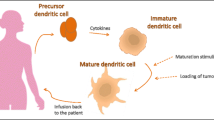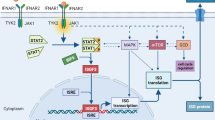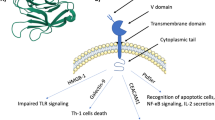Abstract
In the present study we evaluated the response rate and the immunorestorative properties of interferon α2b (IFnα2b) administered to patients with advanced renal cell carcinoma (RCC), melanoma (MEL) or colorectal cancer (CC). We studied the immune status and correlated it with clinical responses. Thirty-five patients with advanced RCC, and 14 with MEL were treated with recombinant INFα2b. The dose was increased progressively from 5×106 IU/day in the first week (three times every week) to 10×106 IU/day in the second week and thereafter to 15×106 IU/day subcutaneously. In patients with CC INFα2b was given at 5×106 IU/day every other day (three times every week); these patients also received (together with INF) leucovorin 200 mg m–2 day–1 in a 1-h i. v. infusion every week, and mid-infusion 400 mg/m2 5-FU was administered as an intravenous bolus every week. The response rate was as follows: for RCC, 6 patients achieved partial response (PR), 10 stable disease (SD), and 21 progressed (PD); for MEL, 5 patients achieved PR and 9 PD; for CC, 6 achieved PR, 5 SD, and 9 PD. In all patients blood was withdrawn prior to INFα2b treatment and then monthly. T lymphocytes, after isolation from peripheral blood, were tested for proliferation in the autologous mixed-lymphocyte reaction and allogeneic mixed-lymphocyte reaction, interleukin-2 (IL-2) production, expression of IL-2 receptors during the allogeneic-mixed-lymphocyte reaction, and the production of IL-1 by peripheral blood monocytes. Striking increases were demonstrated in all parameters 2 months after treatment with INFα2b. In comparison to normal controls, all patients with the malignant neoplasms presented decreased (>45%) mean values of the immunological parameters under investigation (P 0.0001). Responders (patients with RCC, MEL, and PR) presented lower mean values of all the parameters studied than did non-responders (P 0.0001). Patients with CC presented the lowest mean values of the parameters than did the other patients (RCC, MEL) (P 0.0001). After therapy with INFα2b, patients with RCC experiencing PR showed a mean increase of more than 30% (P 0.0001). Patients with SD showed a mean increase of about 20% (P 0.0001), and those with PD showed a 6% increase in the immunological parameters under investigation. Patients with MEL experiencing PR showed a mean increase of more than 30% and patients with PD a decrease of more than 10% (P 0.0001). All patients, regardless of the clinical response, achieved an increase of more than 60% (P 0.0001). Administration of IFNα2b resulted in a marked potentiation of a deficient cellular immune response in vitro in those patients with RCC and MEL who responded to the treatment. On the other hand, non-responders demonstrated a decrease in the examined parameters and, in some, deterioration of the already depressed immunological functions was observed. This observation can have prognostic significance regarding clinical response of INF. In contrast, our findings show that the immune stimulation associated with INFα treatment in all our CC patients did not predict an improved clinical outcome. There are several theoretical explanations for this discrepancy.
Similar content being viewed by others
Author information
Authors and Affiliations
Additional information
Received: 30 November 1996 / Accepted: 25 June 1996
Rights and permissions
About this article
Cite this article
Tsavaris, N., Baxevanis, C., Kosmidis, P. et al. The prognostic significance of immune changes in patients with renal cancer, melanoma and colorectal cancer, treated with interferon α2b. Cancer Immunol Immunother 43, 94–102 (1996). https://doi.org/10.1007/s002620050308
Issue Date:
DOI: https://doi.org/10.1007/s002620050308




